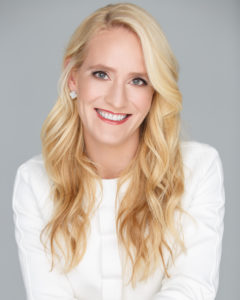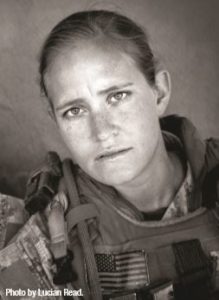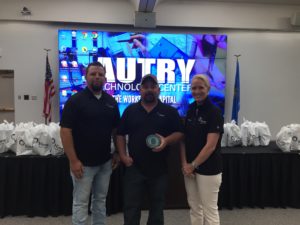In January 2007, President George W. Bush appointed Gen. David Petraeus to lead the multinational ground forces in Iraq. Petraeus immediately launched a plan to secure Baghdad, and one component of his war strategy was to recall Team Phoenix.
Capt. Ann G. Fox, U.S. Marine and one of Petraeus’ original Phoenix recruits, had returned home after serving two tours in Iraq to pursue graduate work. She had just accepted a job with Goldman Sachs when she learned of Petraeus’ newest appointment.
Fox planned a trip to Fort Leavenworth to visit her former commander, who was preparing for his confirmation hearing before the Senate Armed Services Committee.
“He asked me if I would be willing to go back,” shared Fox. “I had no reason to say no. I felt obligated to go back and serve and do my part.”
Recalling the moment, Petraeus himself is unequivocal.
“The team members returned at my request for another tour when I was made the overall commander in Iraq—in Ann’s case, shortly after earning her MBA at Harvard,” Petraeus said in July. This time, the mission of the team was “to help the Iraqis and coalition forces in that same area to implement the ‘Clear, Hold, Build, Transition’ concept that was one of the keys to the success of the surge,” Petraeus recounted. This phase of the war was eventually known as the Iraq War Troop Surge of 2007.
Cui servire est regnare
Service was modeled for Fox by the military legacy of her grandfather and father. Her experience at the Groton School in Massachusetts where she spent grades eight through 12 provided another layer of character training that would serve Fox well both on the battlefields of Iraq and later in the volatile world of the energy business.
The Groton School motto, loosely translated “to serve is to rule” or “for whom service is perfect freedom,” was used to create a deep sense of community, Fox said. The days began with chapel, where pupils were encouraged to reflect on the ways they could impact those around them, and ended with prayer and the recitation of these words: “Be ever mindful of the needs of others.”
“This closely followed and related to my experience in the Marine Corps,” Fox offered, “where team is everything and individual means nothing.”
After finishing at Groton in 1994, Fox went on to graduate from Georgetown University’s Walsh School of Foreign Service with a Bachelor of Science in Diplomacy and Security in World Affairs. She joined the private sector as an investment banking analyst for both Prudential Securities and Warburg Dillon Read in New York.
In August of 2001, following the footsteps of her grandfather and father, Ann Fox joined the service.

The New York Stock Exchange welcomes Nine Energy Service, Inc. (NYSE: NINE) in celebration of their IPO on January 19, 2018. President and CEO Ann Fox, joined by NYSE COO Stacey Cunningham, rings The Opening Bell®.
“I have just always been a deep patriot,” Fox stated. “I have always loved our country.” Her interest in international relations had deepened during her college years, so enlisting in the U.S. Marine Corps aligned with Fox’s academic pursuits and her patriotic passion.
Petraeus remembers her career well.
“Ann Fox did an exceptional job as a young Marine officer in Iraq on each of her tours there, serving together with then-Capt. Seth Moulton [now a U.S. Congressman] and other Marines in an element we called Team Phoenix, the members of which I recruited personally,” Petraeus remarked.
The original mission of Team Phoenix was to position itself with Iraqi forces south of Baghdad in the area of one of the major coalition countries to determine the requirements for bases and other infrastructure to support the rebuilding of the Iraqi Army and Police, Petraeus explained. Team Phoenix then provided detailed project requests to Petraeus to help contractors and engineers build what was required.
“Ann and the other members of the team did a brilliant job establishing a great relationship with the Iraqis, including during some periods of tough fighting, and facilitating the construction of a much-needed security infrastructure,” Petraeus said.
When Team Phoenix returned during the Surge of 2007, members linked up with the same Iraqi division commander (now the senior Iraqi military officer) and helped his unit and its coalition partners establish bases in key cities in their area, Petraeus revealed.
This was done “so that we could ‘live with the people,’ once again, as that was the only way that we could ensure their security and eliminate the presence of insurgent and militia elements,” Petraeus continued. “Once again, Ann and the other team members proved to be intrepid, determined, innovative, and exceedingly competent in the performance of their mission during a period of considerable challenges. Ultimately, they contributed importantly to the overall success of the year-and-a-half surge.
“I remain to this day very grateful to Ann and the other members of Team Phoenix,” Petraeus concluded. “And it has been great to watch her achieve considerable success in her new endeavors in Texas.”
Intrepid, Determined, Innovative
When Fox returned home from her third tour, she settled in Houston to be closer to her parents.
“I bumped into energy,” she recalled with a laugh.
In 2008, Fox joined SCF Partners, a specialized oilfield services private equity firm, where her responsibilities included the evaluation and execution of new investment opportunities as well as the support of ongoing portfolio company initiatives. During her time at SCF, she participated in the Partners Investor Committee and served as managing director.
In February 2013, Fox joined Nine Energy Service, Inc., SCF Partners’ largest oilfield services company specializing in completion and production solutions. She first served as the CFO and vice president of Strategic Development; in July 2015, Fox was named president and chief executive officer of Nine Energy, referred to as simply “Nine” by Fox and others within the company.
Those three words Petraeus used to describe Capt. Ann Fox and her teammates—intrepid, determined, innovative—were pivotal as Fox took leadership of a company that, along with oil and gas firms across the nation, was on the cusp of a downturn.
One of the first memos Fox sent out as CEO addressed base pay cuts and full bonus suspensions. The company numbered about 1,000 employees, and approximately 50 percent were terminated.
Fox and her leadership team set the tone with the upper-level employees taking the deepest cuts.
“The corporate office was in no way protected,” Fox emphasized. Rather, the servant-leader mentality meant “command would bear the greatest sacrifice.”
“There were days when you asked yourself, ‘Are you going to have any revenue to work with,’ ” Fox remembered.
“The worst thing you can do is overthink a problem,” Fox reasoned. The leadership circle had to make challenging decisions quickly, such as whether or not to shut down a location or take on a client at a discounted price.
Nine Energy survived the 2015-16 downturn “with the determination of a team” and went public in January 2018, (NYSE: NINE).
Following several mergers, Nine is some 2,300-employees strong today. Headquartered in Houston, Nine now has operating facilities in the Permian, Eagle Ford, SCOOP/STACK, Niobrara, Barnett, Bakken, Marcellus, and Utica, as well as throughout Canada.
Fox’s peers in the energy industry have taken notice of her widespread accomplishments. In June 2018, Fox was selected as a winner of the EY Entrepreneur of the Year Award in the Gulf Coast area for energy. The award recognizes entrepreneurs excelling in areas such as innovation, financial performance, and personal commitment to their businesses and communities.
In June of this year, Fox was elected to the Devon Energy Board of Directors. Upon her nomination for election, then-chairman John Richels cited her “impressive credentials and experience.”
Fox has also earned the respect of her employees, who are quick to recognize her personal commitment to not only the company, but employees at every level.
“Ann leads in the way she conducts herself,” shared Mark Wright, Northeast operations manager. “She actually gets down into the business and visits the employees. She’s very much on-the-ground with everybody else and leads by example. That’s hard to find, especially in someone that is so high up that usually won’t come see the employees on the ground, or you just don’t get that direct communication.”
“And when she has visited, she takes the time to talk to every individual,” Wright continued. “That’s rare. I love the way she leads, and everyone follows her for that reason.”
Clair Holley, Nine’s chief technology officer, cited Fox’s work ethic as “second to none.”
Navigating the Latest Speed Bumps
Some four years after assuming leadership of Nine, Fox is leading the company through another down cycle characterized by a slow fizzling of what had been, a few short years ago, a headline-grabbing frenzy often referred to as “Permania.”
“Right now, I don’t see a repeat of 2015 or 2016,” Fox explained. Rather, what she does see is a cooling of the landscape with investors focusing on free cash flow generation, and exploration and production (E&P) customers focusing on living within their means.
The current industry landscape is also marked by what Fox labels as “speed bumps,” including infrastructure limitations and the challenges arising from the tight spacing of wells.
“The tide turned in the beginning of 2019 for our customers,” Fox noted. “Wall Street has been unhappy with the energy sector for years, and has now demanded that our customers stop outspending their cash flows.
“The year 2019 is the first year we have seen the E&P companies be serious about meeting these expectations,” she continued. “Managing their companies in this fashion is a shift change from the past, and it will take more than a year to figure out how to properly balance growth and cash flow generation in a depletion-based business where the unconventional shale wells have steep decline curves. These factors, coupled with volatility in commodity prices and the speed bumps, have cooled the industry landscape.”
However, Fox believes one of the greatest things about the United States is its ingenuity and innovation.
“Every time we hit a speed bump, we eventually find a way around it,” she said with enthusiasm. For example, companies are already taking the time to adjust well spacing, and service companies like Nine are figuring out ways to do things cheaper, better, and faster.
“That is the name of the game in North American shale,” Fox observed, “to get the cost to complete a lateral foot to continue to decline without impeding its productivity. We will continue to find ways to drive down our cost per barrel.
“Our ability to be competitive in the global market with our crude products is significant because we are not subsidizing a population with each barrel,” Fox continued. “It is much easier for our engineers to figure out how to design better and cheaper tools than for some of our competitors in the Middle East to figure out how to diversify their economies,” she added. “And we have finally started exporting product off of the Gulf Coast, which is an absolute step change for the industry and for the country.”
One other very exciting development for service providers like Nine is the presence of the “super majors” like Exxon and Chevron who are making significant investments in West Texas and New Mexico, which many never would have predicted, Fox shared.
“We are sitting in a great place in the globe to extract these prolific resources,” she declared. “This is a really big game changer.”
Along with smart business strategy and successful navigation of the bumps that will always be a part of the cycle, Fox continually relies on those tenets she nurtured at Groton and during her tours of duty.
1. Assume no task is beneath you, and be willing to work harder than anyone around you.
2. Remember that you are nothing without your team. If you begin to believe your contribution is individual, you are wrong.
3. Remember you always have a great deal to learn from those around you, from those on the ground level to those at the very top.
_____________________________________
By Julie Anderson









